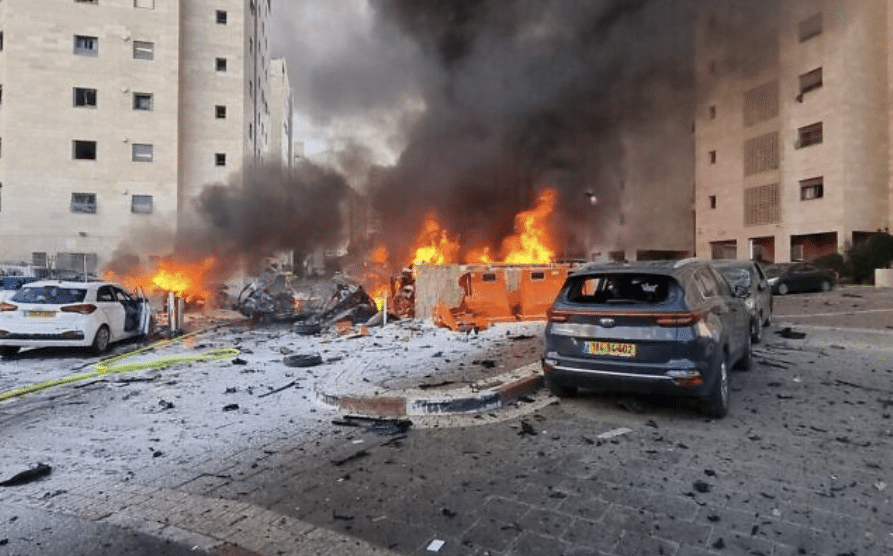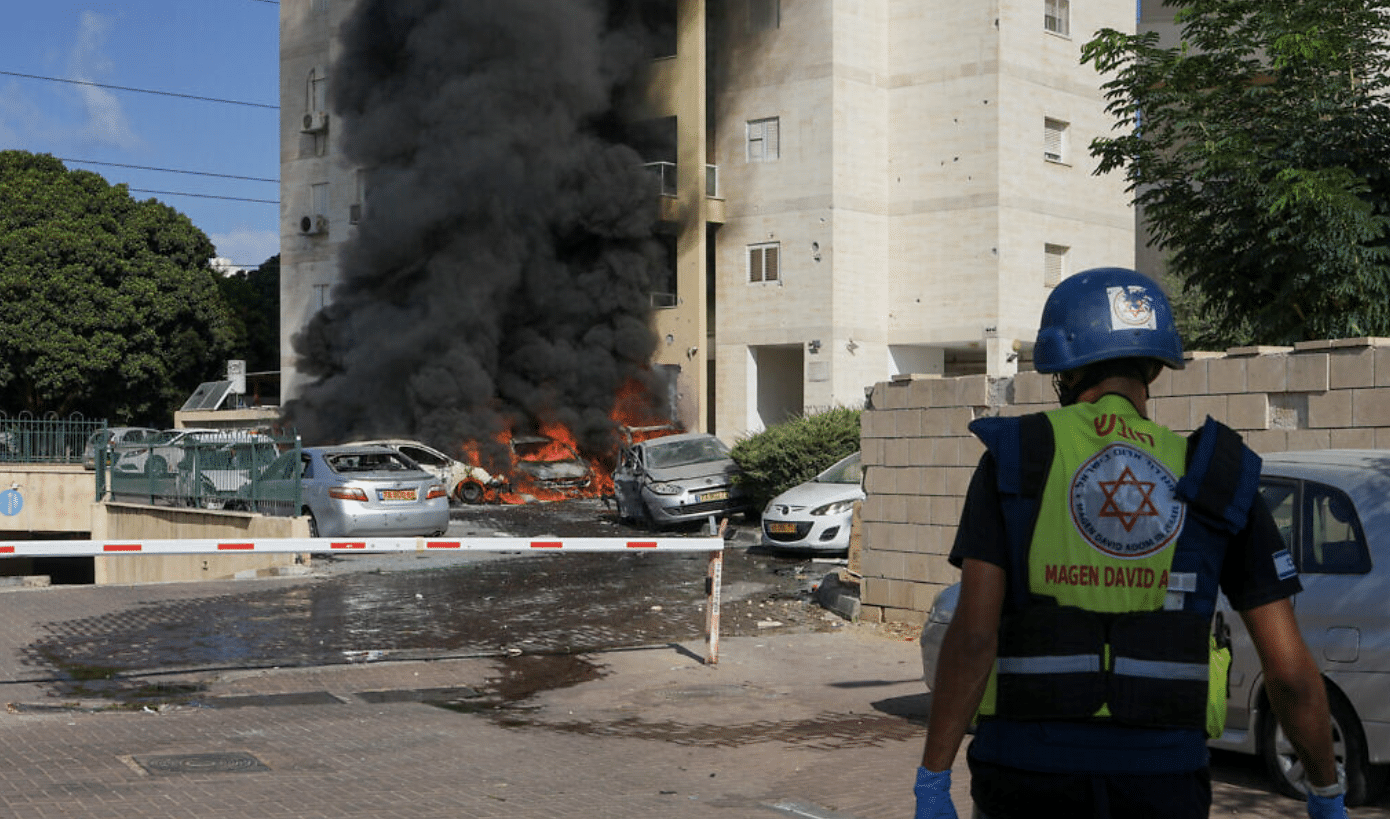Israel Under Brutal Suprise Attack
As dawn unveiled the day, tranquility was disrupted, leading to an ambience of turmoil and trepidation. The Israel-Gaza border, historically marked by cycles of violent confrontations and uneasy calm, was jolted by a meticulously planned and executed offensive that caught Israel off guard.
Also Read: Official Numbers: At Least 1,200 Israelis Killed and 150 Abducted to Gaza
Over 5,000 Rockets Fired on Israel by Palestinian Militant Groups
In the tranquil hours of the morning, as Israelis marked the concluding day of the Sukkot festival, over 5,000 rockets pierced the skies, heralding an attack that mirrored the surprise offensive of the Yom Kippur War half a century earlier. The attackers, militants from the Gaza Strip, had not only launched rocket barrages but also skillfully infiltrated Israeli borders, inciting a state of emergency.
Israeli Prime Minister, Benjamin Netanyahu, in a voice edged with resolve and somber reality, declared to his citizens and the world, “We are at war.” The initiation of the combat was not just an assault; it was a statement of intent, a rekindling of ancient fires, an assertion of deep-seated grievances.
Israel Defense Force (IDF) troops, caught in the crossfire, engaged in combat with the infiltrators. The town of Sderot became the focal point of intense clashes, with casualties mounting, anxiety escalating, and a nation thrust, unwittingly, into a theater of war.
Hamas terrorists seen clashing with Israeli forces in southern Israel. pic.twitter.com/uJWd07xpVO
— Emanuel (Mannie) Fabian (@manniefabian) October 7, 2023
Israel Calls up 10,000 reserve Troups
Defense Minister Yoav Gallant, amidst the ensuing chaos, authorized a widespread call-up of reserves. The IDF, transitioning into a state of war readiness, was not just responding to an attack – it was preparing for a protracted conflict. The nature of the attack was unprecedented, and the response, as assured by Netanyahu, would be formidable.
The militants, believed to be linked to Hamas, had not only mastered the art of surprise but were also signaling a level of coordination and intensity hitherto unexhibited. The IDF’s Chief of Staff, Lt. Gen. Herzi Halevi, amidst the din of rocket sirens and the grim reports of casualties, was orchestrating a response, planning actions that would not only repel the attackers but underline Israel’s resilience.

The international community, bystanders to this sudden escalation, were witnesses to an unfolding drama that echoed past conflicts yet harbored unique, unpredictable ramifications. The rocket impacts, resonating across towns and cities, were not just physical strikes; they bore messages, echoing the complexities of a conflict deeply rooted in history, politics, and identity.
Mohammad Deif, a prominent figure within Hamas, justified the attacks as retaliation against perceived Israeli transgressions at the Al-Aqsa mosque. The world was once again thrust into a narrative interspersed with religion, territorial claims, and the intricate, often volatile dance of geopolitics.
Amidst the rocket fires and emerging stories of gallantry and tragedy, the Israeli society was being tested. The proximity of bomb shelters and the wail of sirens were not just immediate responses to an attack; they symbolized a nation’s collective memory, resilience, and unyielding spirit.
The unfolding events were a haunting reminder of the fragility of peace. Each rocket, each report of a wounded citizen or fallen soldier, and each rallying cry for resistance underscored the complex tapestry of the Israel-Gaza relationship. A narrative not just of conflict, but of intertwined histories, echoed adversities, and the elusive pursuit of peace.
Operation “Iron Swords”
As the Israeli military embarked on “Operation Iron Swords” in response to the surprise attack, questions lingered. The escalation of violence, the apparent preparation and resolve of the militants, and the nature of Israel’s response heralded uncertain times.
An analysis of the unfolding events cannot be divorced from history. The echoes of past confrontations, the unhealed wounds, and the undimmed aspirations of both Israelis and Palestinians are intrinsic to understanding the present conflict.

Abductions – Hamas Claims to have Kidnapped Israelis to Gaza Strip
Reports of abductions, the tragic demise of individuals caught in the crossfire, and the fervent declarations of leaders underscored a conflict that is as much about present realities as it is rooted in historical narratives. The militants, through this attack, have not just challenged Israel’s military; they have invoked a discourse, complex and multifaceted, encompassing territorial claims, identity, and the perennial quest for dignity and justice.
Netanyahu Declares War as Hundreds of Israelis Slaughtered
Benjamin Netanyahu, Israel’s Prime Minister, stood amidst the echoes of explosions and the visceral reality of an unfolding war. His words, underscored by gravity and an unyielding resolve, reverberated with the nation and the world, “We are at war, not in an operation or in rounds, but at war.” The solemnity of the Prime Minister’s assertion was as much a call to arms as it was a stark acknowledgment of a confrontation that had spiraled beyond anticipations.
In the midst of this unexpected escalation, the Israel Defense Forces (IDF) responded with a declaration that was to define the nature and scope of their counter-offensive. Codenamed “Iron Swords”, this operation signified a resolve forged in the fires of unexpected adversity and the inherent imperatives of national defense. As rockets penetrated the serene skies, igniting a conflagration unprecedented in its suddenness and intensity, Israel, a nation accustomed yet never indifferent to conflict, found itself thrust into a theater of war that defied routine classifications.
This was not a fleeting engagement or a cyclical bout of hostilities, but a war – pronounced in its immediacy, unyielding in its complexity. The Hamas militants, emboldened and strategic, exhibited a level of coordination and audacity that transcended past encounters. Southern Israeli towns, historically resilient and defiant, faced an incursion that was as intricate in execution as it was profound in its implications.
In these critical junctures of combat and confrontation, the narrative of the Israeli-Palestinian conflict was not just reiterated but significantly amplified. Every rocket that traversed the skies, every town that grappled with the unanticipated incursion, underscored a historical conflict perpetually oscillating between periods of uneasy calm and abrupt hostility. “Iron Swords”, as a military operation and a symbolic moniker, epitomized Israel’s instantaneous transition from a nation in celebratory repose to a
As the world observes, questions emerge. Can there be a lasting peace? How will this unexpected offensive shape the political and social dynamics of the region? In the ash and echoes of rockets, amidst the narratives of loss and defiance, these questions loom, seeking answers amidst a conflict as ancient as it is contemporary.

